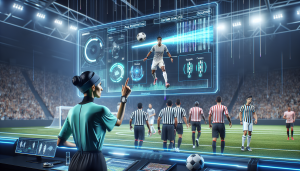 UseCasesFor.ai
UseCasesFor.ai
Choose Topic
 UseCasesFor.ai
UseCasesFor.ai
AI Use Cases
A collection of over 250 uses for artificial intelligence
A continually updated list exploring how different types of AI are used across various industries and AI disciplines,including generative AI use cases, banking AI use cases, AI use cases in healthcare, AI use cases in government, AI use cases in insurance, and more

Sign up
to receive a PDF containing all the use cases and stay updated with the latest AI trends and news (you can always unsubscribe)
Referee decision support

Introduction
The advancement of the technologies such as machine learning (ML) and computer vision artificial intelligence (AI) has not only changed the world of business and daily life but also the sports industry. AI has been widely adopted in the sports industry, particularly in referee decision making processes due to the integration of AI. In this article, the author will explore the depth of how ML and computer vision AI are applied in referee decision support, the challenges, the solutions, the benefits, the ROI and the real-world applications.
Challenges
There are, however, a number of issues that can hinder the use of AI in sports. These are the challenges that are associated with the integration of the AI systems with the current structures, the problem of training the AI models because sports are unstructured activities, the problem of dependence on the AI, and the resistance from the fans and the sports aficionados who still want the human element in sports. Also, there are issues with the accuracy, fairness, and transparency of the decisions made by AI which present ethical concerns.
AI Solutions
There are two main categories of AI solutions which include ML algorithms and computer vision techniques. ML algorithms are trained with historical data and are therefore able to provide predictions as well as make decisions given new data. While computer vision is capable of processing and understanding the digital images and videos, the traditional form of data that is used in sports. It could be in sports for example in identifying fouls in football with the use of systems for instance VAR (Video Assistant Referee) or in tennis to establish whether the ball has indeed crossed the line by the use of Hawk-Eye technology. Also, AI can help in enhancing player’s performance, managing injuries and developing game strategies.
Benefits
There are a myriad of reasons to incorporate AI in sports as well. First of all, AI can assist in improving the referees’ performance and making their decisions more accurate and just with the help of big data thus increasing the fairness of the game. Second, AI can work at speeds that are not humanly possible making it efficient in making decisions in real time. Third, it can also assist in generation of useful information on players and even help in predicting injuries which may enable teams to come up with better strategies. Finally, it is possible for AI to change the fan experience in a positive way and provide individual approaches.
Return on Investment
There are significant return on investment (ROI) when it comes to application of AI in sports. Although it requires a lot of money to set up initially, the benefits that come with it such as enhanced decision making, high fan engagement, and better player performance are immense. In addition, the application of AI also offers a way of increasing viewership and sponsorship because of the perception of the game being fair and safe. However, it should be understood that the ROI in this case is not only the financial gain, but also such factors as the increase of the game integrity, fan’s satisfaction, and player’s security.